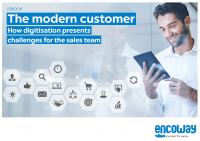How digitisation presents a challenge for the capital goods industry
Today, we purchase products online for our own private use, such as clothing and electrical goods, as a matter of course. But what are things like in the B2B sector?
Digital transformation and the resulting increased customer requirements have also significantly changed the sales process for complex machines, components and devices that require explanation. Existing and perspective customers are now already well informed before they get in touch with one of your sales staff. They know exactly what they want and are familiar with the solutions available on the market. Important decision-making and management positions are often already occupied by digital natives. And they enter sales discussions with a level of knowledge and demands on advice and service that are entirely different to just a few years ago.
Time is limited and the customer is impatient
Customers and potential clients no longer have the time for lengthy sales discussions. They expect the same quick, convenient shopping experience that they are familiar with in the B2C environment. Today, you will not be able to impress a customer with detailed product promotion, countless pages of technical features, and long waiting times for quotations. Customers expect individually tailored quotes that provide the perfect solution for their requirements and demonstrate the benefits for their company – and all this as quickly and simply as possible.
Therefore, if you want to offer your customers a modern digital sales process, it is no longer enough to give your sales staff tablets and send them off to the customer. Far more important are sustainable solutions and strategies that allow customers to offer a state-of-the-art shopping experience and thus differentiate themselves from the competition. It is vital to not only keep a close eye on the individual marketing channels, but also to implement a centralised solution that you can enhance with new applications and adapt to meet future requirements whenever necessary.
With a modular CPQ solution, you are not only able to market multiple-variant products more effectively and generate accurate quotations faster, but you are also able to manage and maintain complex portfolios in a far more efficient way.
Read in the eBook how a CPQ solution can help you to …
- meet the needs of your customers in the digital age.
- stand out from the competition.
- optimise costs.
- open up new sources of revenue.
- offer real added value to existing and prospective customers.

Head of Sales and Marketing, encoway GmbH
LinkedIn



